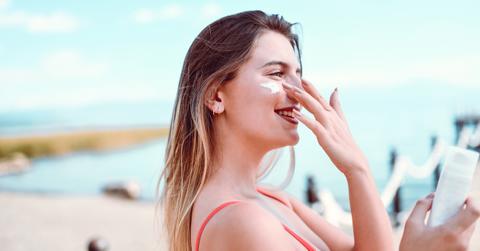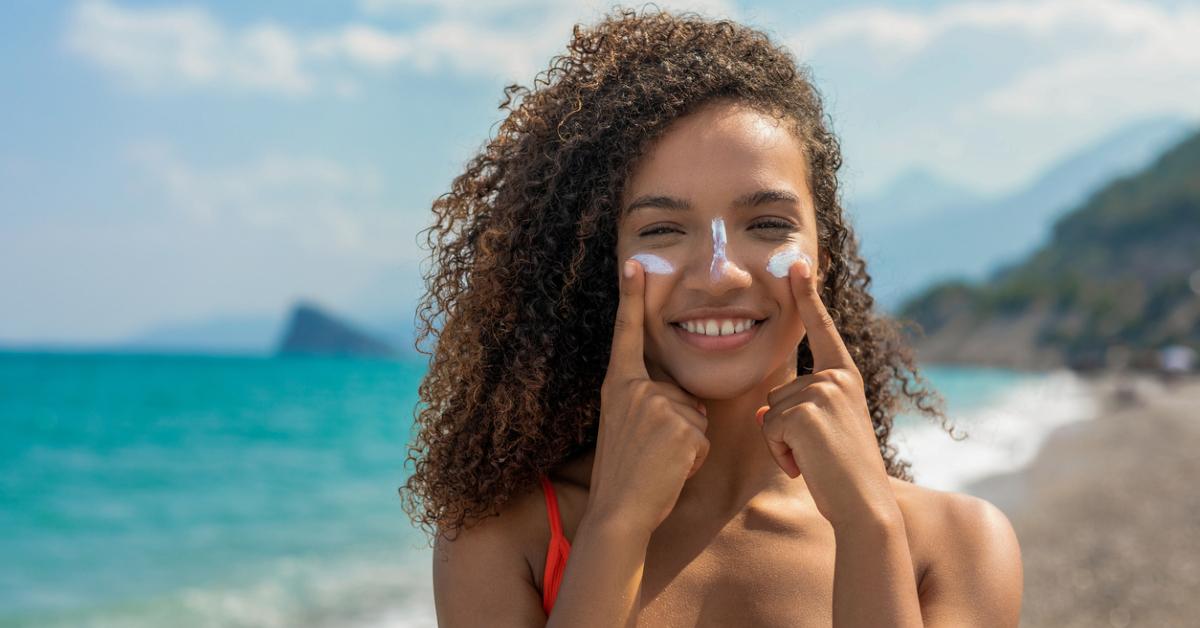How Much Sunscreen to Put on Your Face, According to a Dermatologist (Exclusive)
Published Nov. 28 2023, 3:58 p.m. ET

The Gist:
- A good daily SPF protects against UVA and UVB rays, which can play a role in aging, burning, and the development of skin cancer.
- Dermatologist Dr. Mamina Turegano explains that most people do no apply an adequate amount of sunscreen on a daily basis.
- She recommends that people apply 1/3 to 1/2 teaspoons to the face and neck.
Moderate sun exposure is good for boosting mood, providing vitamin D, and improving quality of sleep, as per GoodRx Health. There's even evidence suggesting it can lower blood pressure and help treat skin conditions like psoriasis, eczema, acne, and jaundice, according to the Apotheco Pharmacy Group. Still, it's been drilled into our wrinkly brains that ultraviolet radiation is bad and SPF (Sun Protection Factor) is our friend.
A good sunscreen blocks both UVA and UVB rays, as detailed by UC Davis Health. While UVA rays penetrate deeper and give rise to signs of aging, and UVB rays cause burning, both rays are known to lead to the development of basal cell and squamous cell skin cancers.

Being that skin cancer is the most common cancer across the globe, and people now more than ever are on a mission to look 25 and youthful forever, the suncare industry is booming. According to a CNN story on a market analysis report conducted by Grand View Research, the worldwide value of suncare products was $10.7 billion in 2020. "That number is projected to grow by 4 percent each year until 2028," the publication wrote.
The rise of Supergoop! and cult Korean sunscreens like Beauty of Joseon's Relief Sun: Rice + Probiotics have made sun protection ... cool! But are any of us applying our daily SPF to our faces correctly? Just how much is enough?
Hoping to settle the ongoing facial SPF confusion, we spoke to award-winning triple board-certified dermatologist, internist, and dermatopathologist Dr. Mamina Turegano, MD, FAAD. The doctor is also a TikTok star with over 1 million followers, often educating and advising users on skincare and health with a holistic approach.
In an e-interview with Green Matters, Dr. Mamina shared her rules for sufficiently applying SPF, touched on risks of insufficiently applying SPF, and revealed her favorite facial sunscreen products. Let's fight wrinkles the right way.
This interview has been edited and condensed for length and clarity.

GREEN MATTERS: How much SPF do you recommend applying to the face?
DR. MAMINA TUREGANO: I recommend about 1/3 to 1/2 teaspoons worth to the face and neck. An easier way to measure out sunscreen is applying it along your fingers and using 2 to 3 fingers worth.
GM: What are some of the most common mistakes people make when applying face SPF?
MT: Most people do not use enough (or none at all). Another mistake is not applying it to the ears or tops of the hands. Also, many people will rely on their foundation with SPF as their daily sunscreen, but that is not enough coverage.
Reapplying is important especially if you are spending more time outdoors, which many forget to do.
GM: What are the risks associated with applying SPF ineffectively?
MT: The biggest risk of not applying an adequate amount of sunscreen is getting skin cancer later in life. The small daily doses of sun exposure that accumulate over time are what contribute greatly to sun damage and skin cancer development. Other risks are accelerated signs of aging like wrinkles and sun spots. It can also accentuate scars (like acne scarring) and hyperpigmentation (like hyperpigmentation associated with melanoma).
GM: What are the "rules" for layering SPF?
MT: I recommend making SPF the last step in your skincare routine, but before applying makeup. After you wash your face, use an antioxidant serum (which further helps with sun protection), followed by a moisturizer if needed, and then sunscreen. And if all you use in the morning is sunscreen, that is great!
GM: Can you mix different sunscreens? Can you mix makeup (like foundation) with an SPF?
MT: It’s okay to mix two sunscreens that are both physical sunscreens (aka mineral sunscreens), but I would not mix a physical sunscreen with a chemical sunscreen or mix two chemical sunscreens. Dilution can alter the effectiveness of the chemical sunscreens.
I would not mix a non-sunscreen, like foundation, with a sunscreen because it could also dilute the sunscreen. You may also run the risk of applying the sunscreen unevenly.
GM: There are loads of face SPF products on the market. What are some of your favorites?
MT:
- La Roche-Posay Anthelios Mineral Tinted Sunscreen For Face SPF 50
- skinbetter science sunbetter TONE SMART SPF 75 Sunscreen Lotion
- Colorescience Total Protection No-Show Mineral Sunscreen SPF 50
- EltaMD UV Clear Broad-Spectrum SPF 46
- EltaMD UV Physical Broad-Spectrum SPF 41
- Eucerin Sensitive Tinted Mineral Face Lotion
- CōTZ Sensitive SPF 40 Non-tinted
- Revision Skincare Intellishade TruPhysical
- ALASTIN Skincare HydraTint Pro Mineral Broad Spectrum Sunscreen SPF 36
- ISDIN Eryfotona Actinica
- Beauty of Joseon Relief Sun: Rice + Probiotics (SPF50+ PA++++)
- Neova SmartSkincare DNA Damage Control Silc Sheer 2.0.